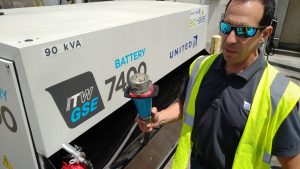[Coalition for Clean Air Staff met with United operations team to see what happens behind the scenes]
The Coalition for Clean Air will present the 2019 Air Quality Award for Corporate Environmental Stewardship to United Airlines at our annual awards luncheon on May 31. We will be recognizing United Airlines for their leadership pursuing electrification and alternate fuels. Their United Eco-Skies® program is an ambitious commitment to the environment, with a goal of reducing greenhouse gas emissions 50% by 2050, a reduction equivalent to taking 4.5 million cars off the road.
At Coalition for Clean Air, we’ve been particularly impressed by United Airlines’ sustainability strategy, which focuses both on the planes they fly and the airport equipment they use. Retiring old aircraft models in favor of newer models that consume 15%-20% less fuel has been a cornerstone of their sustainability efforts. And United is also working to ensure the fuel used by their fleet is as clean as possible: they are the only airline in the United States using sustainable aviation fuel (SAF) on a daily basis. Through a partnership with Paramount-based World Energy, this biofuel results in a greater than 60% reduction in lifecycle CO2 emissions. And a recently announced agreement with World Energy to purchase 10 million gallons of this biofuel further cements their longterm commitment to clean air.

[row]
On the ground, United is fighting for reduced emissions and to protect public health by pursuing electrification wherever possible. In California, 54% of United’s ground fleet has already been electrified. Most recently, they’re replacing diesel-powered employee buses with battery electric buses. In addition, United is the first airline in North America to purchase all-electric ground power units (GPUs) to replace diesel engine use of up to 20 gallons of fuel per hour.

“At United, we are finding new and innovative ways to further minimize our impact on the planet and strengthen our emerging reputation as the world’s most environmentally conscious airline,” said Maria Race, director of environmental programs and policy. “We are strong believers in the importance of investing in the environment to ensure the well-being of our customers, our people and – most importantly – our planet.”

California’s Low Carbon Fuel Standard has played an important role in facilitating investments in lower-carbon intensity aviation fuels. In September 2018, the California Air Resources Board added credits to aviation fuels to participate in the program, a big step forward to help reduce carbon intensity. Since it was adopted, the LCFS has reduced carbon pollution emissions in California by more than 30 million metric tons, equivalent to removing 6.4 million gasoline-powered cars from the state’s roads in one year. The program also reduces toxic air pollution emitted by cars, thereby minimizing impacts on public health.
“United Airlines deserves recognition for being a clean air and climate leader in the airline industry. Whenever I ask airport officials about who’s doing the best to improve air quality and reduce greenhouse gas emissions, they immediately say ‘United.”
Dr. Joseph K. Lyou
President and CEO, Coalition for Clean Air
[/row]









Great I would love to come. My wife has been an employee since 1968. I might even talk her into coming. I’m currently the past chairman of the board of directors for BAAQMD.
I would like to see San Francisco change their employee buses to electric. Gillig has 40 footers available currently and we (CCCTA) have been using 29 footers in Walnut Creek, Ca. for a couple of years. Please contact me at e-mail below and I will put you in touch with the director of Strategic Innovation at the Bay Area Air Quality Management District (BAAQMD). Barsan has a smaller electric shuttle that may be of use also. My wife has been an employee for 51 years and I have seen many improvements at UAL. I currently serve on Mobile Source subcommittee at BAAQMD.